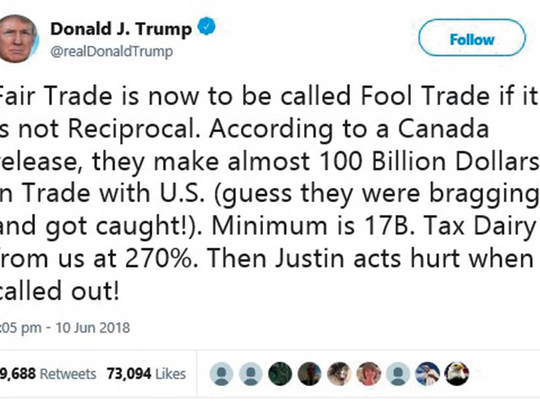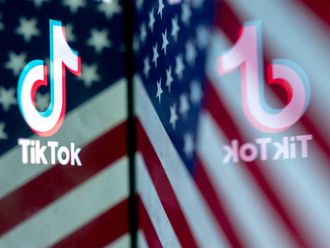
Berlin: Canadian Prime Minister Justin Trudeau may have expected a lot to happen during the G-7 summit last weekend, but being condemned to an after-life in both hell and heaven probably wasn’t on the list.
“There’s a special place in hell for any foreign leader that engages in bad-faith diplomacy with President Donald J. Trump and then tries to stab him in the back on the way out the door ... And that’s what bad-faith Justin Trudeau did with that stunt press conference,” White House trade adviser Peter Navarro said in a Fox News interview Sunday.
The European Union responded swiftly to the attack on Sunday evening, with European Council President Donald Tusk tweeting that Trudeau deserved a “special place in heaven” for organising the G-7 summit.
What caused the rift? As Trump had already left the G-7 summit and was on his way to Singapore for his upcoming meeting with North Korean leader Kim Jong-un, Trudeau gave a press conference in which he went to great lengths to not offend Trump. But the Canadian prime minister still said a few things that didn’t go down well inside Air Force One.
Embedded in more polite remarks, Trudeau reiterated his objections to Trump’s imposition of tariffs on steel and aluminium from Canada, Mexico and the European Union and his own plans to introduce retaliatory measures targeting US products.
“Canadians, we’re polite, we’re reasonable, but we also will not be pushed around,” Trudeau said, triggering a dispute that currently revolves around three key issues.
In the two tweets that ended US support for the joint G-7 statement, Trump accused Trudeau of having made “false statements” during a prior press conference.
“PM Justin Trudeau of Canada acted so meek and mild during our @ G7 meetings only to give a news conference after I left saying that, ‘US Tariffs were kind of insulting’ and he ‘will not be pushed around.’ Very dishonest & weak,” Trump wrote.
Trump tweeted “Based on Justin’s false statements at his news conference, and the fact that Canada is charging massive Tariffs to our US farmers, workers and companies, I have instructed our US. Reps not to endorse the Communique as we look at Tariffs on automobiles flooding the US. Market!”
The president did not specify which exact remarks he considered to be false. Contrary to Trump’s suggestion that Trudeau “acted so meek and mild,” French President Emmanuel Macron wrote of a united front of leaders against Trump, even though participants still described the talks as cordial, according to The Post’s Damian Paletta and Anne Gearan:
“Representatives from other G7 countries said they felt as though they had made progress in conveying their positions to Trump, something many of them felt pressured to do by voters at home.
“Despite the tension, the member states’ leaders were cordial in person, Trump included. He made first-name references to ‘Angela’ and ‘Justin,’ and he repeatedly insisted he blamed previous US leaders, not foreign ones, for what he sees as the global trade imbalance.” Based on that account, Trudeau wasn’t the only G-7 leader who toned down the rhetoric in direct talks.
Before Trump’s pull-out, all G7 nations agreed to a joint reaffirmation of “free, fair, and mutually beneficial trade and investment.” The president later appeared to backtrack from his support for that statement, writing that “Fair Trade is now to be called Fool Trade if it is not Reciprocal.”
Trump tweeted “Fair Trade is now to be called Fool Trade if it is not Reciprocal. According to a Canada release, they make almost $100 billion in Trade with US (guess they were bragging and got caught!). Minimum is 17B. Tax Dairy from us at 270 per cent. Then Justin acts hurt when called out!”
Trump has repeatedly complained about Canadian tariffs on imported dairy products — and hell or heaven aside, the truth is that neither the United States nor Europe nor Canada are exactly angels when it comes to their trade policies.
It’s true that Canadian farmers benefit from high tariffs on imported dairy, while many US farmers are facing an existential crisis. Due to Canada’s protectionist dairy industry, Canadian farmers earn much more per litre of milk. Canada argues that it still allows a higher ratio of sold milk to be imported from abroad than the United States does and that there is not necessarily a causal relationship between the crisis of the US industry and Canadian tariffs.
In his tweets following the G-7 summit, Trump also indicated that he may soon target foreign cars produced for the US market. “I have instructed our US. Reps not to endorse the Communique as we look at Tariffs on automobiles flooding the US. Market!” he wrote.
At the moment, the European Union targets US-built cars with a 10-percent tariff, while the United States distinguishes between vans or pickup trucks and other cars. The former are targeted with a 25-percent tariff, while a 2.5 per cent tariff applies on other vehicles. European carmakers argue that they employ tens of thousands of American workers across the United States and that any tariffs would result in US layoffs.
In tweets and public remarks, Trump has said that he believes Europe and Canada are engaging in unfair trade practices that put the United States at a disadvantage. But to justify his steep tariffs imposed on Canada, Mexico and the European Union, Trump has relied on an obscure provision that allows member states of the World Trade Organisation to claim exemptions from its obligations if national security is at stake.
Indeed, 90 per cent of primary aluminium that US companies rely on to make products, including fighter jets, is imported from abroad, which has served as an argument to those keen to defend Trump’s desire to revive the American aluminium industry.
That argument, however, has rarely been used by WTO member states, partially because proving that the exception applies is usually difficult and virtually impossible in Trump’s case.
That’s why European leaders and Trudeau consider the tariffs illegal and have said that Trump’s national security argument is flawed. “I highlighted directly to the president that Canadians did not take it lightly that the United States has moved forward with significant tariffs on our steel and aluminium industry,” Trudeau said Saturday.
“Particularly, [they] did not take lightly that it’s for a national security reason that for Canadians ... who stood shoulder to shoulder with American soldiers in far off lands in conflicts from the First World War onward, it’s kind of insulting.”












